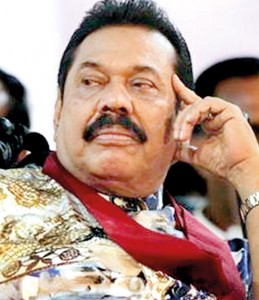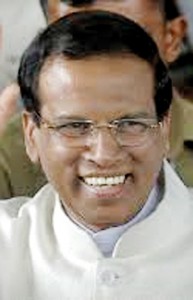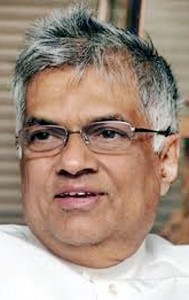If it was the closest Ranil Wickremesinghe would get to be President all but in name, it was the nearest Mahinda Rajapaksa could have reached to enjoy executive powers again in a new role as prime minister and act as de facto president. But with the Supreme Court dictated dilution that redefined the 19th Amendment, both men’s hopes to ascend higher ground lie dashed in the dust; and both men’s executive ambitions remain the stuff of vain political pipe dreams.

For Ranil Wickremesinghe it may only be a temporary setback for the way still remains open for him to contest the nation’s highest office at a future date. For twice elected President Mahinda Rajapaksa, however, the full import of the Supreme Court bespoke 19th Amendment, if passed by the required two-third’s majority when it is presented in Parliament tomorrow, will be fatal.
For Maithripala Sirisena, his prayer to abolish the executive presidency or at least reduce its powers has gone unanswered. The specific bundle of executive presidential powers he so magnanimously wished away that would have castrated the presidency, now lie dumped on his doorstep studiously unopened, with the terse tag ‘Return to Sender’ firmly affixed.
Not that he planned it that way, of course. No, and God forbid the ungenerous thought. Having made it his battle cry to do away with the executive presidency and to lead the nation back to the parliamentary system of government, Maithripala Sirisena must rank as one of the few men in history to have actually taken meaningful steps to divest himself of power after having power vested in him. What can he possibly do and who can blame him or take him to task if his efforts are spurned, if his good intentions to keep his promises are scuppered by the Law Lords who held that those powers he is desperate to get rid of and donate to the prime minister must, instead, leech like cling to him until and unless 15 million people personally approve the long drawn removal process?
Whilst others strive for power to aggrandise themselves, Maithripala Sirisena, this political Sadhu Sumedha of Buddhist legend who gave away his wealth to anyone who asked for it, strove to achieve power to become the spendthrift of the powers he would gain. It was almost as if Heaven’s grace had denied his manifesto prayers because the gods, having tested the mettle of his honesty and finding it not wanting, had divined he was endowed so strong with selfless sincerity that he was worthy of the singular honour of retaining and raising the nation’s Sword of Excalibur.

Such unbidden good fortune, however, has not smiled upon Ranil Wickremesinghe or on Mahinda Rajapaksa who covets power, certainly not to give it away.
Take the case of the present Prime Minister Ranil Wickremesinghe first. Under the present constitution the President is the head of Cabinet and appoints as the Prime Minister the Member of Parliament most likely, in his opinion, to command the confidence of the House. He has the exclusive power of appointing the ministers and assigning them their ministerial portfolios. He can do this in consultation with the Prime Minister or without.
But the 19th Amendment Bill as gazetted on March 16 radically redesigned the role of the Presidency. Though it retained the right of the President to appoint the Prime Minister at his sole discretion, it sought
= to make the Prime Minister the head of the Cabinet of Ministers;
= to empower the Prime Minister to determine the number of Ministers of the Cabinet, non-cabinet ministers, state ministers, deputy ministers and
= to determine the subjects and functions they would hold solely at his discretion.
He could also change any such appointments made without anyone’s by your leave. He could also request any cabinet minister to delegate to any minister who was not a member of the Cabinet of Ministers, any power or duty pertaining to any subject or function assigned to such Cabinet Minister. And whilst it empowered him to sack his ministers, it made no express provisions either for the President or for Parliament to sack him. Once appointed, he could not be dislodged.

The sudden prospect of the prime minister enjoying presidential powers would have jolted the former president Mahinda Rajapaksa out from his retirement bed. Though the desperate Gang of Three, namely, Dinesh, Vasu and Wimal, had actively kept the ‘Bring back Mahinda’ show on the road, he would have kept on asking himself the question: bring him back for what?
And then, Ranil Wickremesinghe unveils his proposed 19th Amendment, and presents the answer on a platter. The proposed 19th Amendment as gazetted in March made the prime minister the most important man in the country. He was to be the Head of Cabinet, even the Head of Government. The presidency was to be reduced to a ceremonial role. And in the proposed 19th Amendment placed before the House in March, Mahinda Rajapaksa would have seen the chance to reinvent himself, the opportunity to regain his lost throne, crown and sceptre.
Breaking his silence and casting aside the discretion he had shrewdly maintained till then, he revealed his intention to recapture the power he so much craved. In an interview with the Indian newspaper, the Hindu, published on March 13, he announced his intention to come out of retirement to protect the interest of his family members. He stated he was angered by the actions taken by President Sirisena and Prime Minister Wickremesinghe against his family members and associates. “If they didn’t, I would have just supported this government. But now they want to probe, put us in jail, take our passports without any evidence. How can I retire like this?” he declared.
Since then he had been busy conducting a lukewarm campaign to relaunch himself as the SLFP’s prime ministerial candidate and had started using Buddhist temples around the country as his springboard, holding small political meetings with provincial councilors and other grassroots representatives on temple grounds. Intoxicated by a glittering prime ministerial bauble that had suddenly materialised with the gazetting of the proposed 19th Amendment, Mahinda Rajapaksa had also, without a blush, turned Abayarama Buddhist temple in Narahenpita into his political office and had begun to toll the temple bell to herald his imminent entry to the fray.
But the epitaph on Lanka’s presidential tombstone was not yet ready to be writ; the dirge, whether it was to be sung in Sinhala or Tamil, was still to be composed in final acceptable form.

As the SUNDAY PUNCH commented on March 22 after the proposed 19th Amendment was gazetted, these proposed amendments would not only turn the position of prime minister into one of de facto president and the Executive President, chosen directly by the people, into the nation’s emasculated mascot but would also require a referendum since what was contemplated was not a mere delegation of presidential powers but an actual transfer of powers which struck at the very core of the constitution.
Three weeks later on April 9, the Supreme Court delivered its judgment and opined the same, holding that these proposed amendments, namely, 42 (3), 43 (1), 43 (3), 44 (2), 44 (3) and 44 (5) in Clause 11 which attempted to transfer the President’s executive powers of government to the Prime Minister, was against the Constitution and required the approval of the people at a referendum for it to be enacted.
The strategy for the Prime Minister to constitutionally enjoy far-reaching powers not electorally bestowed had been defeated by the judiciousness of the Supreme Court.
But if the 19th Amendment has not closed the window to Ranil Wickremesinghe’s vista of enjoying presidential power in the future, it has certainly brought the curtain down on Mahinda Rajapaksa’s flamboyant hopes to return to any meaningful position of executive power.
Whether the 19th Amendment is passed or not, the primary status quo of the constitution continues without change. The President is the boss of bosses and the cabinet of ministers, including the Prime Minister, are but underlings owing their positions to the President’s grace — and favour. If Mahinda Rajapaksa glimpsed El Dorado in the proposed 19A, the dizzy moment has passed and the cruel mirage that had so entranced him has vanished without trace. Nothing stares back at him now but a desert of shifting sands sans a rock to plant his mast.
Perhaps, Maithripala Sirisena himself felt emboldened by the Supreme Court decision preventing the transfer of his executive powers to the prime minister, to display his magnanimity and tell a pro-Mahinda SLFP delegation that Mahinda Rajapaksa could contest the general elections under the SLFP banner. Who’s afraid of the big bad wolf, he may have mused, when the Supreme Court had allowed him to keep the axe? But Maithripala was cautious enough to say that he would not name Mahinda as the SLFP’s prime ministerial candidate.
So what now for the former president? In pursuance of his aim not merely to return to Parliament but to gain a position of executive power which he can use to stem the tide of corruption charges rolling in against his own family and his cronies, is there any road open to him that does not lead to a dead end? Would he, having supped the executive feast not once but twice to the fullest and still had hungered for more to go in for thirds; could he, whose gluttony for power made desire feed on desire and feast follow feast, now be sated with a measly crumb that might stir and tumble from Maithripala’s high table to the ground?
The present disarray in SLFP ranks and the confusion existing in Parliament are due to the fact that the UNP-led government does not have the majority seats in Parliament to secure the passage of its legislative bills. This disarray, as President Sirisena said last week, will subside once the elections are held. If the UNP wins the majority of seats, Ranil Wickremesinghe will be the prime minister. Even if Mahinda Rajapaksa contests and wins he will be only another MP. Even if he is elected as the leader of the opposition, so what? The purpose for which he is contesting the election to obtain real power will be lost. Thus this alley will result in a dead end.
If the SLFP is returned with a majority, President Maithripala has two options. He can go in for a national government as provided for in the 19 Amendment and appoint a cabinet more representative of SLFP’s strength in the House. He can woo them to his fold by offering them important ministerial portfolios and hush the dissent. He can exclude Mahinda Rajapaksa completely in which case Rajapaksa will be relegated to playing a maverick role. This way too the real purpose for which he entered Parliament will be defeated and this street too will lead to a dead end.
Or Maithripala may offer the former president a cabinet portfolio; say for instance — given the Rajapaksa penchant for flying — the portfolio of Aviation Services which is presently held by Reginold Cooray. If accepted this would bind Rajapaksa to cabinet secrecy and encumber him with collective cabinet responsibility, but where would that get him? His mouth will be sealed and his hands will be tied. With his purpose frustrated, it would be just another flight of fancy with the runway leading to another cul-de-sac.
Or Maithripala, in consideration of the fact that the SLFP commands the majority seats of the House, can opt for an exclusively SLFP government and can appoint an SLFP member of Parliament who is likely, in the President’s opinion to command the confidence of the House. He can choose, for instance, Nimal Siripala de Silva or any other popular figure and totally ignore any claims made by Rajapaksa as to his own suitability. If Rajapaksa and his loyalists fail to fall in line and support the new SLFP Prime Minister as they are bound by party rules, they can be removed on the grounds of indiscipline.
It is one thing for SLFP members to rebel as they do now when the minority UNP is at the helm. It will be quite another ball game if they rebel against their own party when the president of the country, enjoying vast powers, happens to be the chairman of the party and the Prime Minister is also a member of the party backed with his own loyalist. Efforts by the Mahinda faction to create dissent will serve to isolate them further. It will also lead Mahinda to another dead end.
Now take the extreme case where with a huge SLFP majority President Maithripala transcends his phobia and appoints Mahinda Rajapaksa as Prime Minister. Had the originally proposed 19th Amendment been enacted with presidential powers transferred to the prime minister, Mahinda would have achieved what the people denied him barely four months ago: Power through the back door. But this has not happened. Thanks to the Supreme Court, executive power still remains withthe President Maithripala and he is still the Head of Cabinet with power over all appointments, ministers as well as secretaries of ministries.
While the honour accorded to the office of Prime Minister may still be there, the power that makes it worth coveting it will be gone and Mahinda may well find himself performing not merely a ‘Premadasa’ peon role but, worse, the degrading, humiliating, menial role he condemned D.M. Jayaratne to enact unashamedly for the last five years under his presidency. Is that the fate — to be the footstool of Maithripala — the self-proclaimed King of Lanka Mahinda Rajapaksa is searching for as he eyes the same old eunuchised prime minister post that D.M. Jayaratne endured, which will lead him to the final dead end of his political life?
The other way to power is through the presidency. The 19th Amendment, if passed, will re impose the disqualification that existed, before the 18th Amendment repealed it, for a twice elected president to be elected as president and Mahinda will be automatically be ruled out. Even if the 19th Amendment is not passed, then Mahinda will have to wait for another five years to contest which may not fit in with his game plan, where time is of the essence, to possess power to the stop the probes.
Even in the instance where there is a vacancy in the office of the President due, amongst others, to resignation or death, even if the majority in Parliament wants Mahinda to be president, he will be disqualified from being elected to the post by virtue of Article 40(1) which holds that ‘parliament shall elect one of its members who is qualified to be elected to the office of President.”
All that will be left for Mahinda to do is create impish mischief. Undeniably, though his song is over, the music of his popularity keeps lingering on; and though he has the potential to rock the boat and may even scupper it but he will never skipper it. But will it be worth his while to be the eternal spanner in the works or would it be better for him to pursue a more profitable road.
“In the spring, “wrote Alfred Tennyson, “a young man’s fancy lightly turns to thoughts of love.” Likewise, even as Autumn leaves start to fall on Mahinda Rajapaksa’s path as he traverses towards the biblical age of three score and ten years this November, shouldn’t his thoughts turn pensive, shouldn’t his plans for the fast approaching winter be viewed in a more philosophical mood; and shouldn’t he use the hallowed grounds of the temples which he has begun to tread oft of late, to practice the tenets of Buddhism to gain future spiritual bliss, not the politics of temporal power to bang his head against a dead end wall?